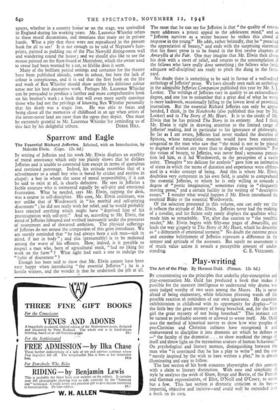Sparrow and Eagle
The Essential Richard Jefferies; Selected, with an Introduction, by Malcolm Elwin. (Cape. 125. 6d.)
IN writing of Jefferies and his work Mr. Elwin displays an acerbity of moral annoyance which only too plainly shows that he dislikes Jefferies and is unable to commend him except in terms of querulous and restricted patronage. Indeed, his attitude resembles that of a schoolmaster to a small boy who is bored by cricket and restless in chapel : a boy in whom the sense of moral responsibility, if it can be said to exist at all, is clearly. defective. He sees in Jefferies a feeble creature who is tormented equally by self-pity and emotional frustration. What he needed, says Mr. Elwin, rapping the desk, was a course in self-discipline. His case, Mr. Elwin continues, was not unlike that of Wordsworth in " his morbid and self-pitying discontent " ; he did not really wish for relief, and he would probably have rejected anything which might have " deprived him of his preoccupation with self-pity." And so, according to Mr. Elwin, the mind of Jefferies laboured and writhed incessantly under the pressures of resentment and of thwarted ambition. The physical sufferings of Jefferies do not arouse the compassion of this grim introducer. We are sternly reminded that " he had always been a sick man—sick in mind, if not in body " ; and this (presumably) is to be reckoned among the worst of his offences. How, indeed, is it possible to respect a man who, born of agricultural stock, " had no liking for work on the farm" ? What rjght had such a one to indulge the "habit of discontent" ?
Enough has been said to show that Mr. Elwin cannot have been very happy when introducing " the essential Jefferies " ; he is a hostile witness, and the wonder is that he undertook the job at all.
The most that he can say for Jefferies is that " the quality of resent- ment addresses a potent appeal to the adolescent mind," and so "Jefferies survives as a writer because he strikes this chord of response in the young." He adds, rather belatedly, that he "preached the appreciation of beauty," and ends with the surprising statement that his finest prcise is to be found in the first twelve chapters of Amaryllis at the Fair. One may imagine that Mr. Elwin then closes his desk with a snort of relief, and returns to the contemplation of the fellows who have really done something; the fellows who (with adequate self-discipline) are ready to pitch the dung in the farm- yard.
No doubt there is something to be said in favour of a well-edited anthology of Jefferies' prose. We have already seen such an anthology in the admirable ,Jefferies Companion published this year by Mr. S. J. , Looker. The writings of Jefferies vary in quality to an extraordinary degree, and one has to remember that a great deal of what he wrote is mere hackwork, occasionally falling to the lowest level of provincial journalism. But the essential Richard Jefferies can only be appre- hended, I think, in the Notebooks (also published this year by Mr. Looker) and in The Story of My Heart. It is to the credit of Mr. Elwin that he has printed The Story in its entirety. And I think Mr. Elwin is right in drawing attention to the limited range of Jefferies' reading, and in particular to his ignorance of philosophy, So far as I am aware, Jefferies had never studied the doctrine of Spinoza, whose naturalistic monism would have been extremely congenial to the man who saw that "the mind is not to be pinned to dogmas of science any more than to dogmas of superstition." For the vision of beauty, to Jefferies, was never final ; sensuous percep- tion led him, as it led Wordsworth, to the perception of a vaster unity. Thoughts " too delicate for analysis " gave him an intimation of states in which the terms of duration and experience were obliter- ated in a wider concept of being. And this is where Mr. Elwin, doubtless very competent in his own field, is unable to comprehend the essential Jefferies, to whom he is only willing. to concede a degree of "poetic imagination," sometimes rising to "eloquently moving prose," and a certain facility in the writing of "descriptive essays." I wonder what would happen if Mr. Elwin introduced the essential Blake or the essential Wordsworth.
Of the selection-presented in this volume, one can only say that it reflects the attitude of Mr. Elwin. Jefferies never had the makings of a novelist, and his fiction only rarely displays the qualities which made him so remarkable. Yet, after due caution to " the youthful reader," Mr. Elwin begins with fifty-one pages of Amaryllis, and leads the way gingerly to The Story of My Heart, which"he describes as " a dithyramb of emotional torment." No doubt the extreme praise and extreme belittlement of Jefferies represent a difference in the temper and aptitude of the assessors. But surely no assessment is of much value unless it reveals a perceptible amount of under


































 Previous page
Previous page